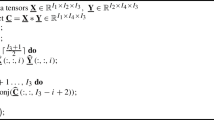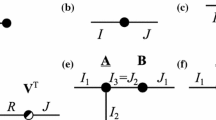Abstract
The oriented singular value decomposition (O-SVD) proposed by Zeng and Ng provides a hybrid approach to the t-product-based third-order tensor singular value decomposition with the transformation matrix being a factor matrix of the higher-order singular value decomposition. Continuing along this vein, this paper explores realizing the O-SVD efficiently by drawing a connection to the tensor-train rank-1 decomposition and gives a truncated O-SVD. Motivated by the success of probabilistic algorithms, we develop a randomized version of the O-SVD and present its detailed error analysis. The new algorithm has advantages in efficiency while keeping good accuracy compared with the current tensor decompositions. Our claims are supported by numerical experiments on several oriented tensors from real applications.







Similar content being viewed by others
References
Bader, B.W., Kolda, T.G.: Matlab Tensor Toolbox, version 3.2.1 (2017). https://www.tensortoolbox.org
Batselier, K., Liu, H., Wong, N.: A constructive algorithm for decomposing a tensor into a finite sum of orthonormal rank-1 terms. SIAM J. Matrix Anal. Appl. 36, 1315–1337 (2015)
Brand, M.: Fast low-rank modifications of the thin singular value decomposition. Linear Algebra Appl. 415, 20–30 (2006)
Carroll, J.D., Chang, J.J.: Analysis of individual differences in multidimensional scaling via an N-way generalization of “Eckart-Young” decomposition. Psychometrika 35, 283–319 (1970)
Che, M., Chen, J., Wei, Y.: Perturbations of the TCUR decomposition for tensor valued data in the Tucker format. J. Optim. Theory Appl. 194, 852–877 (2022)
Che, M., Wei, Y.: Randomized algorithms for the approximations of Tucker and the tensor train decompositions. Adv. Comput. Math. 45, 395–428 (2019)
Che, M., Wei, Y., Yan, H.: The computation of low multilinear rank approximations of tensors via power scheme and random projection. SIAM J. Matrix Anal. Appl. 41, 605–636 (2020)
Che, M., Wei, Y., Yan, H.: An efficient randomized algorithm for computing the approximate Tucker decomposition. J. Sci. Comput. 88, 32 (2021)
Che, M., Wei, Y., Yan, H.: Randomized algorithms for the low multilinear rank approximations of tensors. J. Comput. Appl. Math. 390, 113380 (2021)
Cichocki, A., Mandic, D., De Lathauwer, L., Zhou, G., Zhao, Q., Caiafa, C., Phan, H.A.: Tensor decompositions for signal processing applications: from two-way to multiway component analysis. IEEE Signal Process Mag. 32, 145–163 (2015)
De Lathauwer, L., De Moor, B., Vandewalle, J.: A multilinear singular value decomposition. SIAM J. Matrix Anal. Appl. 21, 1253–1278 (2000)
Drineas, P., Mahoney, M.W.: RandNLA: randomized numerical linear algebra. Commun. ACM 59, 80–90 (2016)
Eckart, C., Young, G.: The approximation of one matrix by another of lower rank. Psychometrika 1, 211–218 (1936)
Eisavi, V.: Hyperspectral remote sensing scenes—gic php (2017). http://www.ehu.eus/ccwintco/index.php?title=Hyperspectral_Remote_Sensing_Scenes
Halko, N., Martinsson, P.G., Tropp, J.A.: Finding structure with randomness: probabilistic algorithms for constructing approximate matrix decompositions. SIAM Rev. 53, 217–288 (2011)
Harshman, R.A.: Foundations of the PARAFAC procedure: models and conditions for an “explanatory’’ multi-mode factor analysis. UCLA Work. Pap. Phonetics 16, 1–84 (1969)
Horn, R.A., Johnson, C.R.: Matrix Analysis, 2nd edn. Cambridge University Press, Cambridge (2013)
Jacod, J., Protter, P.: Probability Essentials. Springer, Berlin (2012)
Kilmer, M.E., Braman, K., Hao, N., Hoover, R.C.: Third-order tensors as operators on matrices: a theoretical and computational framework with applications in imaging. SIAM J. Matrix Anal. Appl. 34, 148–172 (2013)
Kilmer, M.E., Martin, C.D.: Factorization strategies for third-order tensors. Linear Algebra Appl. 435, 641–658 (2011)
Kolda, T.G., Bader, B.W.: Tensor decompositions and applications. SIAM Rev. 51, 455–500 (2009)
Kolda, T.G., Bader, B.W., Kenny, J.P.: Higher-order web link analysis using multilinear algebra. In: Proceedings of the 5th IEEE International Conference on Data Mining, ICDM ’05, USA. IEEE Computer Society, pp. 242—249 (2005)
Lu, C.: Tensor-tensor product toolbox (2018). https://github.com/canyilu/tproduct
Mahoney, M.W.: Randomized algorithms for matrices and data. Found. Trends Mach. Learn. 3, 123–224 (2011)
Martinsson, P.-G., Rokhlin, V., Tygert, M.: A randomized algorithm for the decomposition of matrices. Appl. Comput. Harmon. Anal. 30, 47–68 (2011)
Minster, R., Saibaba, A.K., Kilmer, M.E.: Randomized algorithms for low-rank tensor decompositions in the Tucker format. SIAM J. Math. Data Sci. 2, 189–215 (2020)
Oseledets, I.V.: Tensor-train decomposition. SIAM J. Sci. Comput. 33, 2295–2317 (2011)
Qi, L., Chen, H., Chen, Y.: Tensor Eigenvalues and Their Applications. Advances in Mechanics and Mathematics, vol. 39. Springer, Singapore (2018)
Qi, L., Luo, Z.: Tensor Analysis: Spectral Theory and Special Tensors. Society for Industrial and Applied Mathematics, Philadelphia (2017)
Rokhlin, V., Szlam, A., Tygert, M.: A randomized algorithm for principal component analysis. SIAM J. Matrix Anal. Appl. 31, 1100–1124 (2009)
Saibaba, A.K.: Randomized subspace iteration: analysis of canonical angles and unitarily invariant norms. SIAM J. Matrix Anal. Appl. 40, 23–48 (2019)
Shabat, G., Shmueli, Y., Aizenbud, Y., Averbuch, A.: Randomized LU decomposition. Appl. Comput. Harmon. Anal. 44, 246–272 (2018)
Signoretto, M., Tran Dinh, Q., De Lathauwer, L., Suykens, J.A.K.: Learning with tensors: a framework based on convex optimization and spectral regularization. Mach. Learn. 94, 303–351 (2014)
Sorber, L., Van Barel, M., De Lathauwer, L.: Optimization-based algorithms for tensor decompositions: canonical polyadic decomposition, decomposition in rank-\(({L}_{r},{L}_{r},1)\) terms, and a new generalization. SIAM J. Optimiz. 23, 695–720 (2013)
Tucker, L.R.: Some mathematical notes on three-mode factor analysis. Psychometrika 31, 279–311 (1966)
Vannieuwenhoven, N., Vandebril, R., Meerbergen, K.: A new truncation strategy for the higher-order singular value decomposition. SIAM J. Sci. Comput. 34, A1027–A1052 (2012)
Wang, Z., Bovik, A.C., Sheikh, H.R., Simoncelli, E.P.: Image quality assessment: from error visibility to structural similarity. IEEE Trans. Image Proc. 13, 600–612 (2004)
Wei, Y., Xie, P., Zhang, L.: Tikhonov regularization and randomized GSVD. SIAM J. Matrix Anal. Appl. 37, 649–675 (2016)
Xie, P., Xiang, H., Wei, Y.: Randomized algorithms for total least squares problems. Numer. Linear Algebra Appl. 26, e2219 (2019)
Zeng, C., Ng, M.K.: Decompositions of third-order tensors: HOSVD, T-SVD, and beyond. Numer. Linear Algebra Appl. 27, e2290 (2020)
Zhang, J., Saibaba, A.K., Kilmer, M.E., Aeron, S.: A randomized tensor singular value decomposition based on the t-product. Numer. Linear Algebra Appl. 25, e2179 (2018)
Acknowledgements
We would like to acknowledge the handling editor and three anonymous referees for their useful comments and constructive suggestions which helped considerably to improve the quality of the paper. This work is supported by the National Natural Science Foundation of China (Nos. 12271108, 11801534), the Innovation Program of Shanghai Municipal Education Committee and the Fundamental Research Funds for the Central Universities (No. 202264006).
Author information
Authors and Affiliations
Corresponding author
Additional information
Communicated by Liqun Qi.
Publisher's Note
Springer Nature remains neutral with regard to jurisdictional claims in published maps and institutional affiliations.
Rights and permissions
Springer Nature or its licensor (e.g. a society or other partner) holds exclusive rights to this article under a publishing agreement with the author(s) or other rightsholder(s); author self-archiving of the accepted manuscript version of this article is solely governed by the terms of such publishing agreement and applicable law.
About this article
Cite this article
Ding, M., Wei, Y. & Xie, P. A Randomized Singular Value Decomposition for Third-Order Oriented Tensors. J Optim Theory Appl 197, 358–382 (2023). https://doi.org/10.1007/s10957-023-02177-5
Received:
Accepted:
Published:
Issue Date:
DOI: https://doi.org/10.1007/s10957-023-02177-5




